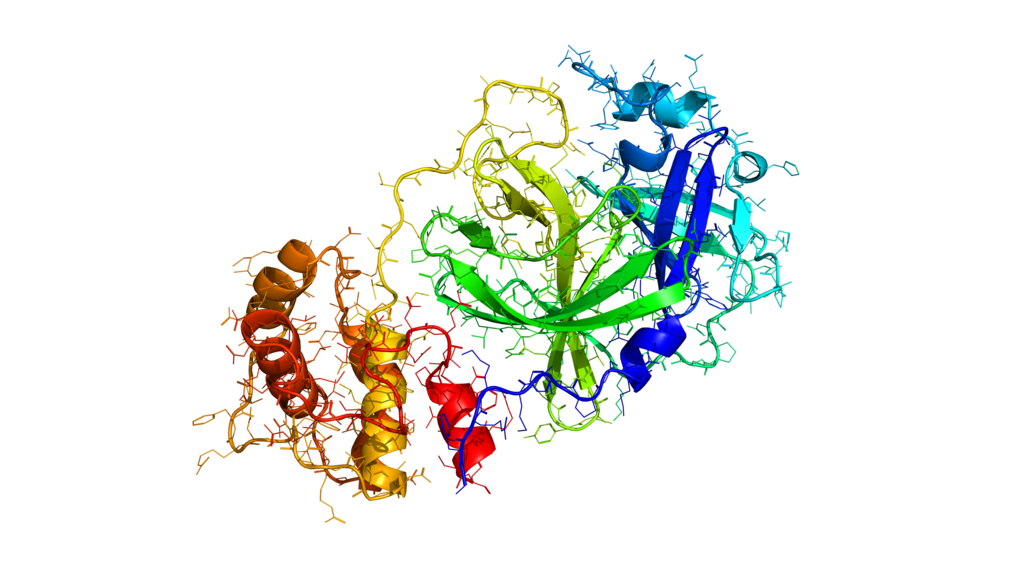
Pharmaceutical company Merck & Co and Ridgeback Biotherapeutics are reporting that their antiviral drug, molnupiravir, is showing promising signs of being effective at preventing severe cases of COVID-19 in patients with mild to moderate forms of the disease. Taken orally, the treatment could be used by patients in their own homes, and cuts the chances of being hospitalized and dying by half, regardless of whether the patient is infected with the deadly delta variant or not.
First developed in 2014 by Emory University as a treatment for influenza, molnupiravir was acquired by Ridgeback Biotherapeutics who later partnered with Merck to further develop the drug. In the lab, it was found to have potential effectiveness against RNA viruses such as influenza, Ebola, chikungunya, and various coronaviruses. In October 2020, Merck launched a one-year Stage 2/3 trial focused on hospitalized patients with COVID-19; a year later, preliminary results showed that molnupiravir cut the risk of hospitalization and death by about 50 percent for newly diagnosed, high-risk patients, and appears to work well regardless of what variant the patient is infected with. The company is applying for emergency use authorization (EUA) from the FDA, and numerous other countries have expressed interest in using the drug as a treatment for COVID.
Molnupiravir has an advantage over currently-used treatments in that it is taken orally, unlike intravenously-administered remdesivir or monoclonal antibody treatments, so a patient using the drug can do so at home, rather than at a clinic or hospital. A full 10-pill, 5-day regimen of molnupiravir costs about $700, about a third of the cost of a monoclonal antibody treatment.
The drug works by producing what is called a ribonucleoside analog when it is metabolized in the body; this is a compound that resembles the chemical used in RNA replication: when the virus’ RNA polymerase (an enzyme that makes RNA from a DNA template) tries to make a copy of RNA that contains molnupiravir, the fake ribonucleoside contamination causes catastrophic mutations in all future copies, resulting in the production of “broken” viruses that can’t infect anyone.
Numerous existing drugs have been tried as treatments against COVID-19, although most efforts have not panned out. Antimalarial drugs chloroquine and hydroxychloroquine were found to cause “serious heart rhythm problems” in patients—a complication that could prove deadly when administered to patients with a disease like COVID-19 that can cause heart failure, arrhythmia and atrial fibrillation. Anti-parasitic drug ivermectin was found to be an effective antiviral agent in the lab, but clinical trials found that to be effective against COVID-19 in a human patient, toxically-high doses of the drug would have to be used. The effectiveness of antiviral drug remdesivir was also found to be too low to be of practical use against COVID-19, although it is still used in extreme cases, in combination with other compounds such as baricitinib or interferon beta-1a.
Experts stress that despite the promising outcome of molnupiravir’s trials, the treatment is no substitute for getting vaccinated against COVID-19, as antiviral drugs do not offer immunity to the viruses they are used to treat; even in the face of reduced efficacy against the delta variant, the vaccines are still more effective at reducing hospitalization and death than what Merck is reporting for molnupiravir. Molnupiravir is also not recommended for use as a prophylactic against COVID-19, as the mutagenic nature of its mechanism of action runs the risk of producing cancer in a long-term user.
Subscribers, to watch the subscriber version of the video, first log in then click on Dreamland Subscriber-Only Video Podcast link.
The emphasis is on “newly diagnosed” COVID-19 people, as you say, since those already hospitalized for COVID-19 do not show much improvement when/after taking molnupiravir.
The cost of a course of this drug is $700.00, as you explain above. But Matthew and everyone, please keep in mind that enormous pressure is being and will be brought to bear on the US FDA to license a generic version of molnupiravir, whose cost will likely be much less than $700.
According to US medical and vaccine researcher Peter Hotez, MD, a dean at Baylor University medical school in Houston, Texas, the mutagenic behavior of molnupiravir may also prohibit its use in pregnant people.
Even so, if molnupiravir continues to stand up against SARS-CoV-2 future mutations, it is likely to help doctors save hundreds of thousands of lives, perhaps millions, in the current and future apparently very long process of ending the COVID-19 pandemic.
Here’s a news update from Johns Hopkins University … they contain the first US school of public health. They state that molnupiravir will be free in the US, evidently courtesy of its US Federal government purchase. When? Johns Hopkins expects that molnupiravir will be approved for doctors to prescribe in the US by the end of 2021. News link:
https://publichealth.jhu.edu/2021/molnupiravir-the-game-changing-antiviral-pill-for-covid-19